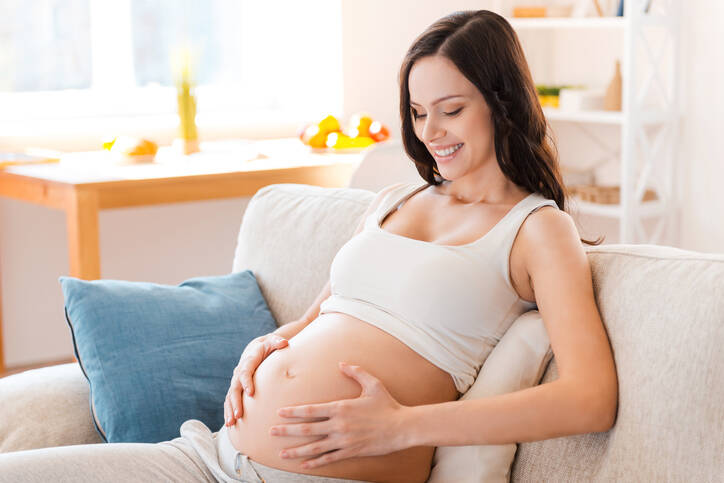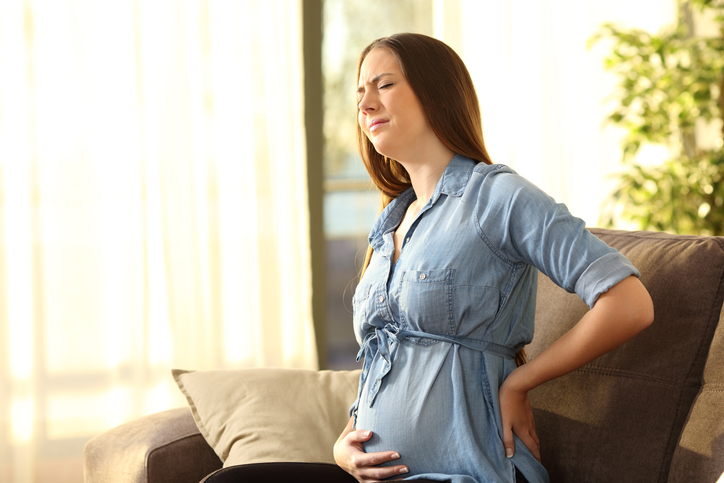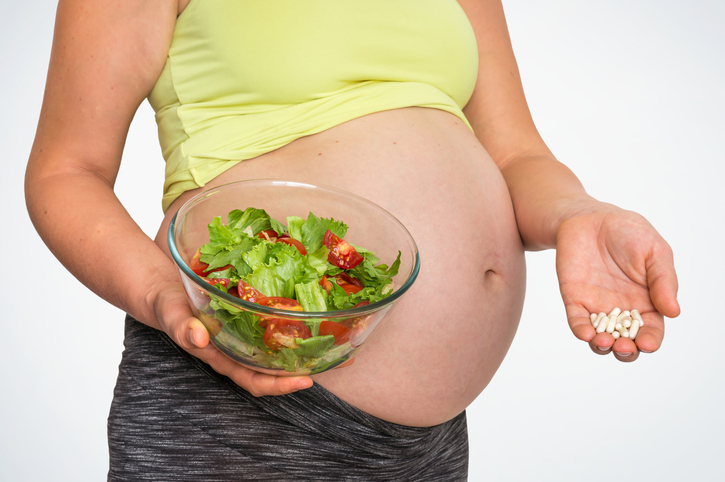- wikiskripta.eu - Filling, emptying and gastric motility
- actualgyn.com - Iron in pregnancy
- whattoexpect.com - 18th week of pregnancy
18th week of pregnancy: movements or pain in the lower abdomen?

At this time, the future mom is becoming more and more aware and feels life under the heart. The baby is already making itself known. Do you know what awaits you in this period?
Article content
If the baby's position allows it, you can see it on the ultrasound.
Don't be stressed by comparing your tummy to other pregnant women. Every mum has a different body type and every pregnant woman's weight gain is individual. However, beware of extreme weight gain.
Also read the articles:
- How much to gain during pregnancy? What does it depend on and what to watch out for?
- Do you know when they form?
- Ultrasound in pregnancy: fetal size, what is fetal biometry?
Baby in the 18th week of pregnancy
The size of the fetus is approximately 18 cm and weighs about 185 g. It is making itself known more and more clearly and emphatically.
Hiccups in the baby's tummy are normal and pose no danger to the baby. These are actually large breathing movements and training of the diaphragm.
You don't need to worry if you haven't noticed any movements yet. First-time mothers in particular feel them later.
The brain and the whole nervous system of the baby is maturing. The cerebral cortex and the more complex connections of the nervous networks, which are already covered with myelin, are beginning to form. Myelin is a substance that helps the whole nervous system to function properly.
The baby's vocal cords and lung chambers are beginning to form. The baby's baby teeth are also forming.
Don't forget that your baby is already aware of the sounds around him. The sound of your heart is his favourite. But you can also talk to him or sing him a lullaby.
The table shows the approximate measurements of the fetus at 18 weeks, as measured by the sonographer
| Total length | CRL Distance from vertex to coccyx | Weight | HC Head circumference | BPD Transverse head diameter | AC Abdominal circumference | FL Femur length |
| 20 cm | 14 cm | 190 g | 147.9 mm | 42 mm | 125.6 mm | 25.5 mm |
Read more about fetal size in the article:
Ultrasound in pregnancy: fetal size, what is fetal biometry?
How does mom feel at 18 weeks of pregnancy?
In addition to the baby's first movements, you may be feeling increasingly pronounced pain in your spine. The growing uterus is pushing your abdomen forward, shifting your center of gravity.
The hormone relaxin causes all the ligaments and joints to relax. Especially those that connect the pelvic bones to the spine. This hormone is needed to properly stretch the pelvis during labour.

A warm bath or a pregnancy massage is good for relieving pain and relaxation. Treat yourself to it for rest and relaxation. It is important to feel good during pregnancy.
Baby's first movements
Every mum-to-be is extremely excited to feel her baby move for the first time. Some mums have already noticed vague sensations in the earlier weeks.
Many describe it as the gentle stroking or fluttering of a small fish, some as the flight of butterfly wings. Over time, they discover that what they feel is really the baby's motor activity.
The baby's first movements can already be felt around the 16th week of pregnancy. However, first-time mothers in particular may not yet be aware of them.
You don't need to worry if you haven't felt anything yet. It can come at any time, and no later than week 22.
If you have any doubts, talk to your doctor.
The first movements of the baby in the tummy are more likely to be felt by women who are slimmer in build or by mums who are not pregnant for the first time. However, at first it may be easy to mistake your own bowel movements or muscle cramps for the first movement.
Every baby is unique and even their movement patterns are different. Don't worry if your baby seems less active than other babies in your tummy.
During the day, a woman may not be as aware of the baby's movements. In addition, during normal activities and movement, the baby is constantly being rocked and put to sleep. The baby tends to be most active in the evening or when the pregnant mother is resting.
Even after you have eaten, the baby may be announcing itself, because, like you, its sugar level has risen, resulting in a burst of energy.
Similarly, when you're nervous, adrenaline is released, which also causes a surge of energy.
Active baby movements in the tummy after sex?
It's not unusual. During lovemaking, your baby is lulled to sleep by the rocking movements and rhythmic contractions of the uterus after orgasm. Afterwards, if you remain calm, your baby may become more active in the tummy.
This is not unusual or dangerous. Unless your doctor has forbidden sex during pregnancy, you have nothing to worry about.
What does sex with sex mean and what are the risks and risks of pregnancy?
This problem can occur often, but also only sporadically. But most moms-to-be have their own experience with heartburn.
Read also .
One of the causes is the growing uterus, which increasingly oppresses other organs in the abdominal cavity. It also contributes to the fact that the whole digestion has become more complicated with the advent of pregnancy.
Gastric secretion is slowed down. The production of hydrochloric acid and other components of gastric juice is slowed down, which greatly affects the digestion of the food taken in. Hormonal changes slow down the passage of food through the intestines.
Therefore, take plenty of time to eat. Eat slowly and chew food thoroughly. Avoid fast eating and swallowing food.
Eat in smaller quantities and more often. Give your body plenty of time to digest.
Iron in pregnancy
Iron deficiency in pregnancy is a relatively common problem. Studies show that more than 50% of women suffer from iron deficiency. About 15% of women suffer from subsequent iron deficiency anaemia.
Risk groups prone to anaemia include:
- women with rapidly following pregnancies
- young pregnant women
- women with a history of heavy menstruation
- vegetarian and vegan women
Iron requirements are increased in pregnancy. Iron deficiency and subsequent anaemia are particularly pronounced in the six-week period.
During pregnancy, blood counts are checked, according to which iron supplements are then recommended. However, this examination does not tell anything about iron stores. Therefore, it is important to think about prevention. Especially in patients at risk, such supplements are given.
Possible consequences of iron deficiency:
- premature birth
- postnatal mortality of the newborn
- postnatal depression
- low birth weight
- poorer mental and psychomotor performance of the child

The best prevention of iron deficiency is a balanced and sufficiently varied diet. Various preparations are also often needed to correct iron deficiency.
Read also:
- Are you anaemic? The cause may not be diet alone
- In pregnancy, beware of anaemia. What are its causes, symptoms?
Read more about the other weeks of pregnancy in the summary article.
Interesting resources
Related










